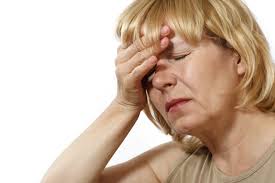This post is focused on addressing the connection between depression and menopause. It’s become an important topic for me because not only do I understand first-hand depression, but women often talk to me about how depression has either crept into their lives as they enter menopause or how menopause has become even more prevalent as they age. Researchers now know that women are 70% more likely to suffer from depression than men and menopause’s hormonal roller coaster can aggravate the problem.
During my last post I mentioned that I would discuss the three different types of depression, but after further research I found that depending on the source—there are between three and nine different types. I’ve always assumed that the three types include: 1) The Blues (mild, periodic, mood-driven) 2) Clinical (more often, need treatment) 3) Manic (series, treatment and medication). I’ve always hovered between #1 and #2. But, throw in menopausal hormones—and, things become complicated. Taking care of kids and working is enough to wear almost anyone down. But, add in a few menopausal hormones and you can easily find yourself overwhelmed, stressed and depressed. Menopause can be the tipping point between seeking help/getting treatment or not, especially if you think you’ve gone beyond “the blues.”
So, what can you do? According to a number of experts, the best thing you can do is put yourself at the top of the list to try and maintain a healthy life balance. It’s time to slow down and realize that the mind-body connection is a powerful one. And, much as we hate to admit it—we’re not in charge of the universe—even though sometimes we like to think so. And, as we have discussed in numerous posts—sleep, sleep, sleep. Not getting enough rest can greatly affect your mental state, along with hormone balance. (Read here for getting to sleep tips.)Stress and menopause can make for an endless anxiety-riddled cycle, requiring women to examine whether their current approach to managing their health is really working. For example, low estrogen can make you feel crummy and you won’t function as well. Throw in lack of sleep due to insomnia or waking in the middle of the night and boom—you’re super stressed.
Because of stress women may recognize depression and turn to self-medicating through alcohol consumption. There is a huge rise of alcohol abuse in older women because they don’t have to get a prescription to drink. Many women closet drink and tell themselves it helps them relax, but might not recognize that they’re drinking because of stress. Also, women build up a tolerance to the effects of liquor and then have to drink more to feel good. Combine that with a prescription sleeping pill and you’ve got real trouble.
A much smarter approach is to have menopause specialist run a hormonal panel. Balancing menopausal hormones is an important first step to feeling better. Often, women find that hormone replacement therapy as recommended by their specialist is enough to get them in top shape. If there is a need for further evaluation by a psychiatrist who might prescribe antidepressants, those meds work more effectively once hormonal levels are closer to normal, especially estrogen.
So, ladies take off your superwoman cap and pause to reflect on implementing positive change in your menopausal life. The only thing you are in control of is you—so, do it. Depression can’t always be avoided, but there are proven ways to help either eliminate or ease the severity of menopausal depression.
Steph
Next post: When to seek help and treatment options.



Leave a Reply